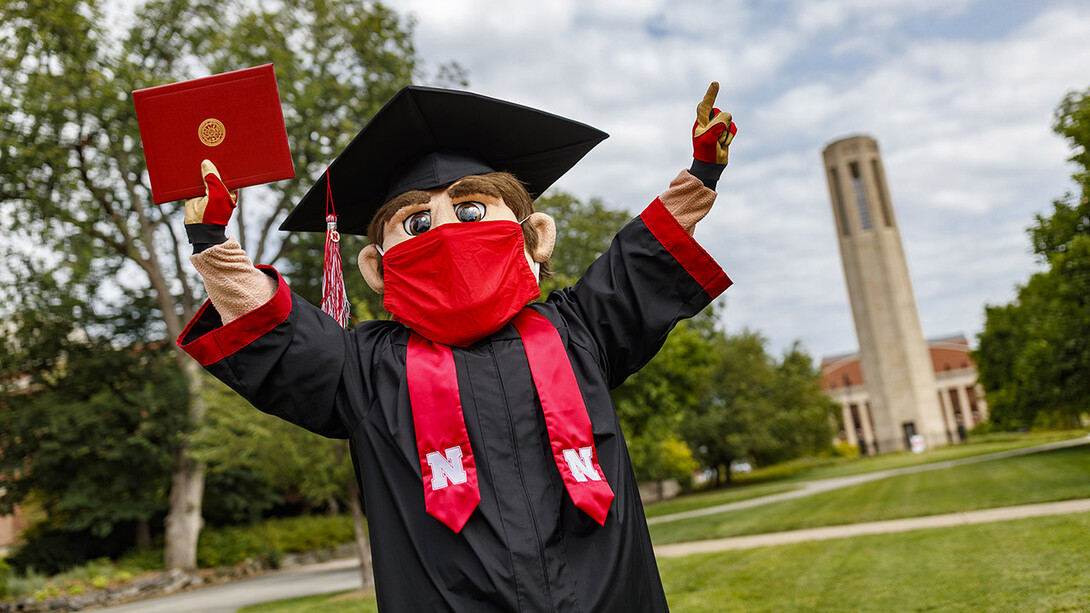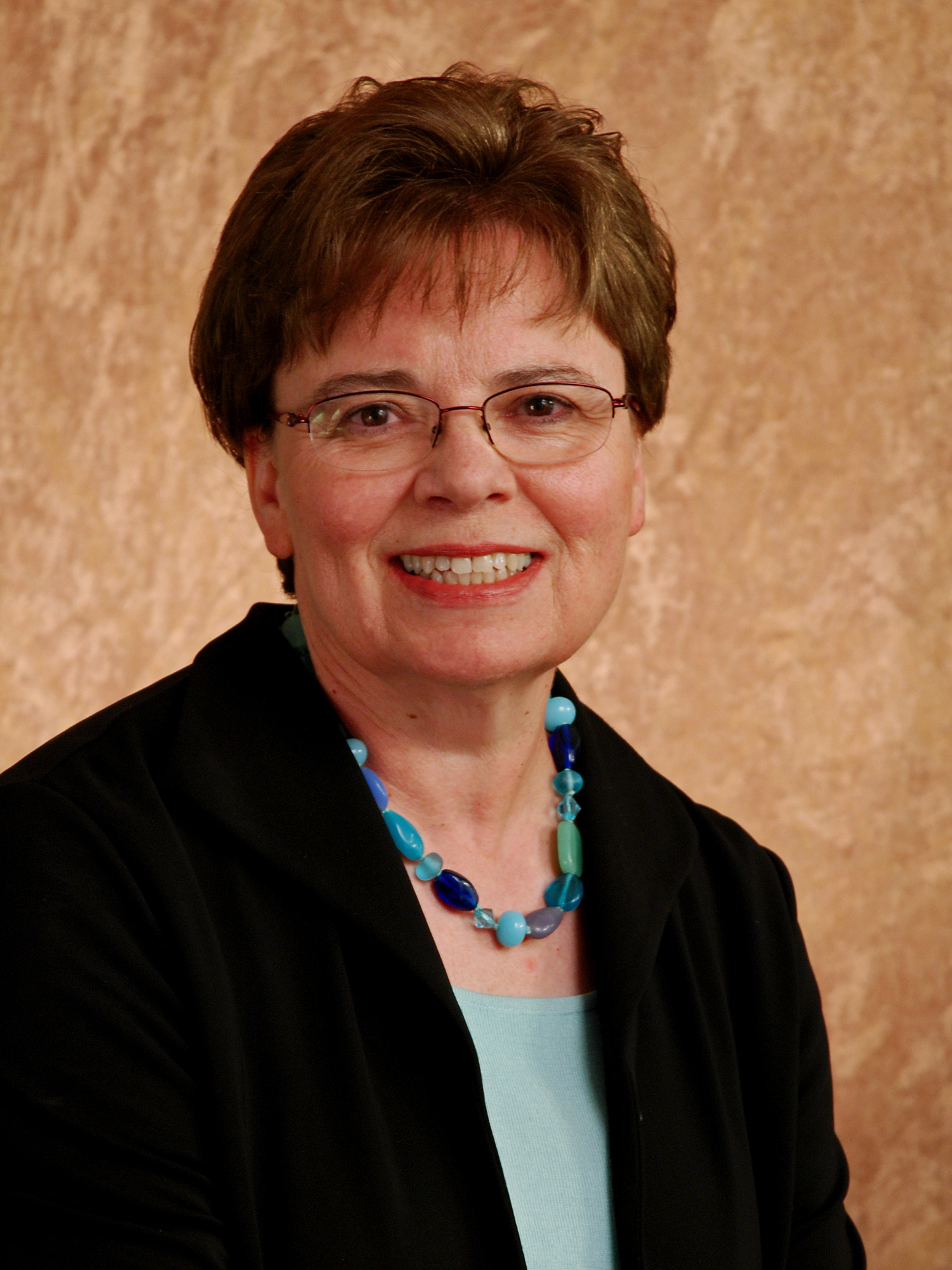
Marilyn Moore challenged the University of Nebraska–Lincoln’s August graduates to help the world write a better story — one with regard for science and the inherent value of humankind, of connections rather than divisions and hope rather than fear.
Full list of graduates | Featured grads | Slides | Program
Moore, retired associate superintendent of Lincoln Public Schools and past president of the Bryan College of Health Sciences, delivered the keynote address, “The Air Between Us,” during a virtual graduation celebration Aug. 15.
The title of the address is based on a line from the Ann Napolitano novel “Dear Edward.” In the book, the title character is the sole survivor of an airplane crash who must rebuild his life in a new home, school and community. The teen is befriended by a neighbor girl named Shay, who manages the right balance of watching out for him and cutting him no slack, Moore said. A high school physics teacher also introduces him to the Large Hadron Collider and research on particle physics, which attempts to answer the questions of the smallest particles, their speed, behavior and relationships to one another.
“In Edward’s mind, the questions are at the very heart of existence — his and everyone else’s,” Moore said.
As the story ends, Edward is growing stronger in every way and he reflects on all of the people who were part of his rebuilding process — especially his uncle, physics teacher, principal and Shay. He says, “The air between us is not dead space.”
I am so humbled to be a #Huskers family where I spent past 4 yrs. My special appreciation to my advisor Dr. Maharjan and committee members & my friends from @UNLAgroHort. Thank you @UNLincoln for the opportunity to learn and grow. #GoBigGrad #ClassOf2020 #GoBigRed #GlobalNebraska pic.twitter.com/ijmcU3QqlB
— Dinesh Panday (@dineshpanday) August 15, 2020
Moore said she is struck by Edward’s story for many reasons.
“I started my career as a middle school teacher, and I shall always and forever have a special place in my heart for the students in the middle,” she said. “Edward was 12 when the plane crashed, right in the middle of middle school, which is a hard time for most early adolescents. Like Edward, I’m attracted to the wonders of our world revealed by the physicists, and the metaphors for life from particle physics. And like Edward, I wonder about the air between us … and I so agree that it is anything but dead space.”
Moore said the past five months have given people ample opportunity to consider their societal connections. A worldwide pandemic and the killing of George Floyd “have sent waves of questions, doubts and fears through the air between us,” she said.
“The pandemic has changed how we work, how we learn, how we socialize, how we transact business, how we travel, how we worship,” she said. “It has changed how medical care is delivered, how courtroom cases are heard, how legislatures conduct business and how children are educated.
“George Floyd’s murder and the subsequent racial unrest has caused people in this country and around the world to reconsider what they believe to be true about history, to compare what a community’s or nation’s stated values are to the lived experiences of people within that community or nation, and to think again about language, and symbols, and power, and voice.”
Moore said these disruptions have been hard moments, yet they remind people of their interconnectedness.
“Both disruptors made abundantly clear that no one stands alone, that the idea of the rugged individual is far less viable than the idea of the common good,” she said.
Moore noted that people are dependent upon scientists, health care workers, essential workers, neighbors and colleagues to make it through the pandemic. Likewise, people are dependent on one another to emerge through the racial unrest and tension that has marked the past three months and four centuries.
“This is a time that forces those of us in the majority culture to confront and acknowledge our own biases and actions, our part in a society marked by systemic racism,” she said. “This is communal work. It is work that happens because we listen, we hear, we reflect, and we act.”
Moore said people have the opportunity to create new knowledge, connections and stories in the air between us.
“In the days going forward, we have the grand opportunity to do better, to strengthen communities, to take actions for health and healing, to make decisions for the greater good,” she said.
Congrats to Kate Cain on her early graduation!
Today she receives her Bachelors of Science in Management!#GoBigGrad pic.twitter.com/rdeYY7PjgU— Nebraska WBB (@HuskersWBB) August 15, 2020
Moore told the graduates that they’re in the best position “to help the world write a better story, to strengthen the air between us, a story of regard for science and regard for the inherent value of humankind, a story of connections rather than divisions, a story of hope rather than fear.”
Returning to the novel, she said Edward was captivated by the study of sub-atomic particles, which some physicists describe as “bundles of potential.”
“I love that phrase – the image of light and energy all bundled together, ready to explode into action, and affect, and impact,” she said. “Poised on the precipice of this next step, you are a bundle of potential. You bring all that and more to your next step. So, go and do. The world is waiting for you to write the new story of the air that is between us.”
The university conferred 731 degrees during the virtual celebration. The 722 graduates are from 44 countries, 37 states and more than 70 Nebraska communities.
Chancellor Ronnie Green hosted the program, which streamed online. He pointed out that the university has held a formal commencement ceremony nearly every year since 1869; however, one exception was during the Spanish Flu outbreak of 1918.
“Back then, as now, we didn’t let world events get in the way of figuring out other ways to recognize the great accomplishments of our graduates,” he said.
The Go Big Grad celebration also included guest appearances by notable Nebraskans, campus leaders and alumni. Graduates received gift boxes in the mail with caps and tassels, allowing them to turn their tassels as a class.
Turn those tassels — you did it! Congrats to our August 2020 graduates. Welcome to the alumni family! #GoBigGrad pic.twitter.com/1sU093fIU7
— University of Nebraska-Lincoln (@UNLincoln) August 15, 2020
Diplomas will be mailed to graduates. New this year, 2020 graduates will be able to download and share their digital diplomas. Details are available here.
All August 2020 graduates are invited to participate in a future commencement ceremony.
“While we're excited to celebrate today, this online video is certainly not a substitute for the real thing,” Green said. “So, we sincerely invite our graduates to come back to your alma mater and join us at one of our future in-person ceremonies at Pinnacle Bank Arena. You'll get to walk across the stage, and we'll be giving you special recognition as the class of 2020.”
The August graduating class earned three new Juris Doctor degrees, 364 new graduate and professional degrees and 367 new baccalaureate degrees. The university has awarded 299,962 degrees since it was founded in 1869.








